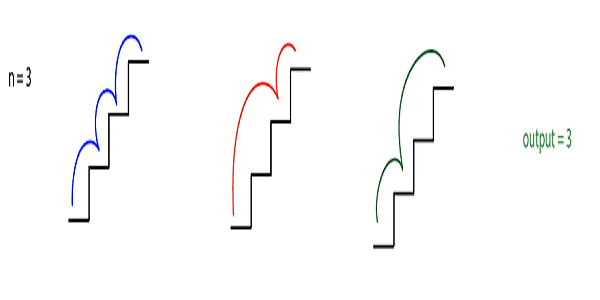Problem
Submissions
Hints & solutions
Discuss
Count Ways To Reach The N-th Stairs
Moderate
0/80
Average time to solve is 30m
Problem statement
You have been given a number of stairs. Initially, you are at the 0th stair, and you need to reach the Nth stair.
Each time, you can climb either one step or two steps.
You are supposed to return the number of distinct ways you can climb from the 0th step to the Nth step.
Note:
Note: Since the number of ways can be very large, return the answer modulo 1000000007.
N=3

We can climb one step at a time i.e. {(0, 1) ,(1, 2),(2,3)} or we can climb the first two-step and then one step i.e. {(0,2),(1, 3)} or we can climb first one step and then two step i.e. {(0,1), (1,3)}.
Detailed explanation ( Input/output format, Notes, Images )
Input format :
The first line contains an integer 'T', which denotes the number of test cases or queries to be run. Then the test cases follow.
The first and the only argument of each test case contains an integer 'N', representing the number of stairs.
For each test case/query, print the number of distinct ways to reach the top of stairs. Since the number can be huge, so return output modulo 10^9+7.
Output for every test case will be printed in a separate line.
You do not need to print anything. It has already been taken care of.
Constraints :
1 <= 'T' <= 10
0 <= 'N' <= 10^5
Where 'T' is the number of test cases, and 'N' is the number of stairs.
It is guaranteed that sum of 'N' over all test cases is <= 10^5.
Sample Input 1 :
2
2
3
Sample Output 1 :
2
3
Explanation Of Sample Input 1 :
In the first test case, there are only two ways to climb the stairs, i.e. {1,1} and {2}.
In the second test case, there are three ways to climb the stairs i.e. {1,1,1} , {1,2} and {2,1}.
Sample Input 2 :
2
4
5
Sample Output 2 :
5
8
Explanation Of Sample Input 2 :
In the first test case, there are five ways to climb the stairs i.e. {1,1,1,1} , {1,1,2} , {2,1,1} , {1,2,1} , {2,2}.
In the second test case, there are eight ways to climb the stairs i.e. {1,1,1,1,1} , {1,1,1,2} , {1,1,2,1}, {1,2,1,1}, {1,2,2},{2,1,1,1},{2,1,2} and {2,2,1}.
Hint
Hint 1
Hint 2
Hint 3
Hint 4
Can you try to explore all options at each step and count the total number of ways?
Approaches (4)
Approach 1
Approach 2
Approach 3
Approach 4
Brute Force
One basic approach is to explore all possible steps which can be climbed with either taking one step or two steps. So at every step, we have two options to climb the stairs either we can climb with one step, or we can climb with two steps. So the number of ways can be recursively defined as :
countDistinctWayToClimbStair ( currStep, N ) = countDistinctWayToClimbStair ( currStep+1, N ) + countDistinctWayToClimbStair ( currStep + 2, N )Where “currStep” denotes the current step on which the person is standing, and N denotes the destination step.
Time Complexity
O(2^N), Where ‘N’ is the number of stairs.
There will be ‘N’ steps to climb, and at every step, we have two options to climb. So there will be 2^N ways to climb ‘N’ stairs which is the size of the recursion tree.
Recursion tree for N=5 would be like this :
Space Complexity
O(N), Where ‘N’ is the number of stairs.
In the worst-case scenario, when we climb one step each time, then the depth of the recursion tree will be ‘N’. So space complexity will be O(N).
Video Solution
Unlock at level 3
(75% EXP penalty)
Code Solution
(100% EXP penalty)
Count Ways To Reach The N-th Stairs
Javascript (node v10.20.0)
Console



